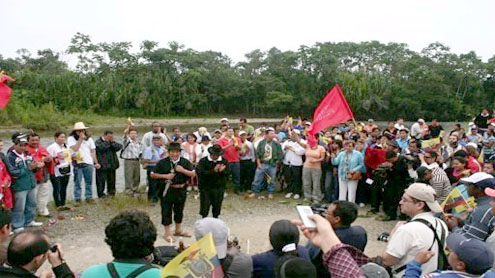 Indigenous protesters in Ecuador have begun a two-week march across the country against plans for large-scale mining projects.
Indigenous protesters in Ecuador have begun a two-week march across the country against plans for large-scale mining projects.
Several hundred protesters set off from an Amazon province where a Chinese company has been authorised to develop a huge open-cast copper mine.Ecuador’s main indigenous organisation, Conaie, says mining will contaminate water and force people off their land.President Rafael Correa says it will help fund much-needed development.He has accused Conaie of trying to destabilise the country.Thousands of his supporters joined a rival demonstration in the capital, Quito.
The indigenous protest march has support from some opposition parties as well as student and teachers’ organisations.Under the slogan “For Life and Dignity of the Peoples” the demonstrators set off from the town of El Pangui in Ecuador’s Amazon rainforest region.Some carried banners reading “Chinese companies get out of Ecuador”.The marchers hope more people will join their protest along the 700km (435 mile) route to Quito in the Andean highlands.
‘New era’
Earlier this week the Ecuadorean government signed an agreement with Chinese mining company Ecuacorriente to invest $1.4 billion (£900m) in a copper mining project near El Pangui. President Correa has hailed the agreement as marking the start of a “new era” in Ecuador.He says royalties and taxes from the mine and similar projects will fund roads, schools and hospitals.
He also says local people will benefit from a generous share of the revenues.But Conai – the Confederation of Indigenous Nationalities of Ecuador – says mining will damage the environment and displace entire communities.It also says indigenous rights to be consulted about development on their ancestral territories are not being respected.
Ecuador’s indigenous movement played a leading role in the overthrow of two previous presidents in 1997 and 2000.Conaie supported Mr Correa’s rise to power in 2007, but has since fallen out with him over his development plans.Mr Correa sees foreign investment in mining as vital to the future of Ecuador’s economy, which depends on oil exports. – BBC












